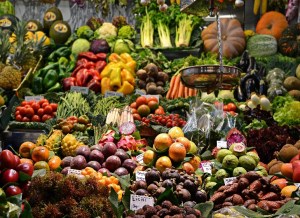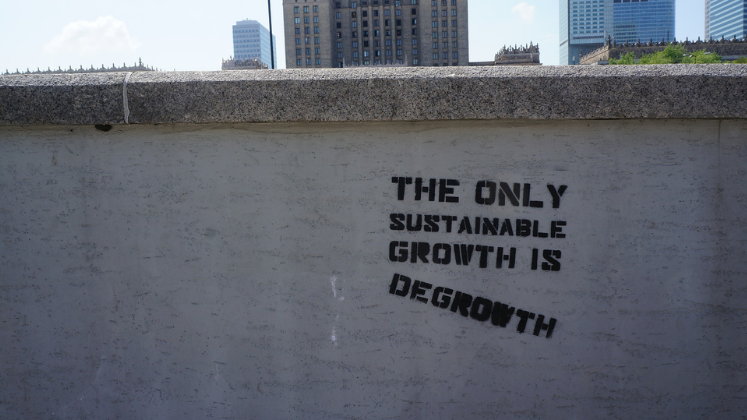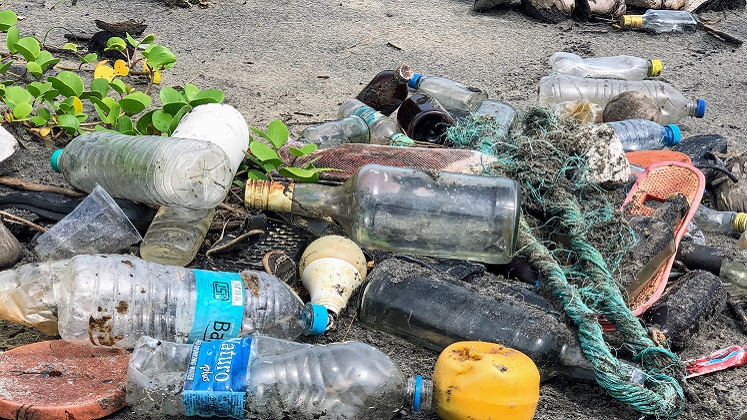In this post, written to coincide with COP27, Daniele Pollicino (PhD candidate in the Department of Psychological and Behavioural Science at LSE) argues that, to date, there has been a lack of discussion around sustainable food consumption, critical for protecting climate commitments. Will COP27 be different?
The COPs are mainly used as an opportunity for leaders and people in power to get attention, using many different kinds of greenwashing…So as it is, the COPs are not really working, unless of course we use them as an opportunity to mobilise.
Greta Thunberg (who said these words), arguably the most iconic climate activist on the planet, will not be attending the 27th U.N. Climate Conference (COP27) in Sharm El Sheikh, Egypt, which will begin on Sunday 6 November 2022. Action on climate has been an urgent issue for years, and today millions of people are hyper-aware of the need to act. The stakes are higher than ever, but is it poised to make a difference?
A look at the past
 Last year, COP26 was described by many as “a disappointment” and “a failure”, and it received considerable criticism of the absence of plant-based policy from the agenda.
Last year, COP26 was described by many as “a disappointment” and “a failure”, and it received considerable criticism of the absence of plant-based policy from the agenda.
Food has been regarded as the elephant in the room at COP26. During the two weeks of negotiations in Glasgow, not a single day was exclusively dedicated to food systems. Finance, transport, energy had been allocated their own days, whereas “Farming” was included more generally in Nature Day. Even then, talks primarily focused on protecting forests and land but less about cutting meat consumption, food waste or change farming subsidy systems. Both industry representatives and campaigners were not content with the level of attention on to food systems paid by the conference, which was also highly criticised for providing a food menu consisting roughly 60% animal-based products – the equivalent of “serving cigarettes at a lung cancer conference” a spokesperson for Animal Rebellion said.
Why is the absence of food so important?
 Overall, it is safe to say food systems were not prominently featured neither on the agenda nor in most state and business actors’ climate commitments. Why is the failure to recognize the effects of the dominant food industry on the climate so important? Food systems are responsible for at least one-fourth of total global greenhouse gas emissions (Poore & Nemecek, 2018). For decades, the paradigms of capitalism, e.g., extractivism, intensification, and homogenization, and the logic of industrialization have shaped how and by whom food is produced, distributed, marketed, and consumed. The power is all in the hands of a small number of actors, i.e., multinational corporations, resulting in global industrial food chains locked in a vicious cycle of producing an ever-increasing volume of cheap, low-quality food, which damages people’s health, fuels the climate crisis, and destroys nature.
Overall, it is safe to say food systems were not prominently featured neither on the agenda nor in most state and business actors’ climate commitments. Why is the failure to recognize the effects of the dominant food industry on the climate so important? Food systems are responsible for at least one-fourth of total global greenhouse gas emissions (Poore & Nemecek, 2018). For decades, the paradigms of capitalism, e.g., extractivism, intensification, and homogenization, and the logic of industrialization have shaped how and by whom food is produced, distributed, marketed, and consumed. The power is all in the hands of a small number of actors, i.e., multinational corporations, resulting in global industrial food chains locked in a vicious cycle of producing an ever-increasing volume of cheap, low-quality food, which damages people’s health, fuels the climate crisis, and destroys nature.
Sustainable food systems
For many, the lack of attention on sustainable food systems is a missed opportunity. There is growing evidence they can play a major part as a solution to the climate crisis. Applying the principles and practices of agroecology and food sovereignty can yield a wide range of ecological benefits based on knowledge systems, e.g., traditional and Indigenous knowledge, that promote biodiversity, reduce waste, restore natural resources and keep carbon in the soil. These principles also ensure socioeconomic benefits as they value upholding farmers and workers’ rights, equity and well-being, and supporting decent livelihoods. In terms of individual action, transitioning to plant-based diets is one of the single most effective ways to reduce emissions. What we eat has a huge impact on climate change, yet it could also be extremely powerful to tackle climate change, i.e., specifically reducing meat and dairy consumption.
The role of social science at the COPs
 So why has the topic of changing diets not been on the table at the COPs? Notwithstanding social sciences burgeoning representation in global interdisciplinary research collaborations on climate, e.g., the Intergovernmental Panel on Climate Change (IPCC), it is still limited, and it has not achieved its full potential in this space. However, the role of behavioural scientists and psychologists may be more necessary than ever to promote the adoption of a blueprint to change public behaviour to shift food consumption and cut carbon emissions. Nielsen and colleagues (2021) argue that by putting impact first in the research agenda, social scientists can “earn an important role in addressing local, national, and global environmental problems” and rise to the historic responsibility of our times.
So why has the topic of changing diets not been on the table at the COPs? Notwithstanding social sciences burgeoning representation in global interdisciplinary research collaborations on climate, e.g., the Intergovernmental Panel on Climate Change (IPCC), it is still limited, and it has not achieved its full potential in this space. However, the role of behavioural scientists and psychologists may be more necessary than ever to promote the adoption of a blueprint to change public behaviour to shift food consumption and cut carbon emissions. Nielsen and colleagues (2021) argue that by putting impact first in the research agenda, social scientists can “earn an important role in addressing local, national, and global environmental problems” and rise to the historic responsibility of our times.
What was achieved at COP26
In all fairness, COP26 negotiations were not entirely devoid of discussions about food; agricultural production was included in several initiatives and programmes:
- The Policy Action Agenda for a Just Transition to Sustainable Food and Agriculture, supported by 16 countries representing 11% of global agricultural emissions, i.e., Ethiopia, New Zealand and the UK.
- The launch of the Agriculture Innovation Mission for Climate (AIM4C) initiative, a joint venture led by the USA and UAE and signed on to by more than 30 countries, i.e., Australia, Brazil, and Ukraine, pledged to increase investments for climate-smart innovation and development by US$4 billion over the next five years.
However, the AIM4C initiative was condemned for only putting forward “solutions” which only perpetuate business-as-usual over truly transformative solutions. Such initiatives will do little to change the status quo and the past few decades have demonstrated that pursuing the latest ‘techno-fix’ cannot meaningfully address global food security and climate issues. Agribusiness-led ‘silver bullet’ innovations never fully delivered as real solutions. Furthermore, all of the announcements rely on voluntary commitments, with no enforcement mechanisms. Countries individual Nationally Determined Contributions (NDC)* still do not contain detailed concrete targets to reduce emissions from their food and agricultural systems. Those that recognise the need for changes in the food system, solely focus on agricultural production, not food consumption. A recent UN report has found that almost 90% of the $540bn in global subsidies given to farmers every year are “harmful”. This agricultural support scheme fosters inequality by excluding smallholder farmers, while benefitting large, industrialised groups best placed to gain access to subsidies.
The question is: can COP27 be any different?
There are positive signs. For the first year, there will be a dedicated Food4Climate Pavilion. A coalition of food awareness organisations lead by NGO ProVeg International, it will highlight how the food and agriculture system needs to change in order to effectively tackle the climate crisis.
 Over 100mq will be dedicated to the topic of food systems change. “Approval by the UN to set up the Food4Climate Pavilion at COP27 really marks a tectonic shift in the UN’s approach to food systems” said Raphael Podselver, Head of UN Advocacy at ProVeg International. Using the banner “Diet Change Not Climate Change”, the organisation will put food centre stage during these crucial negotiations and encourage UN member states to acknowledge that the transition to more plant-based food consumption is key mitigation and adaptation solution and should part of their climate policies. The private sector will also be present, with food companies such as Upfield, Oatly and Impossible Foods bringing their experience in driving dietary shifts towards more plant-rich diets.
Over 100mq will be dedicated to the topic of food systems change. “Approval by the UN to set up the Food4Climate Pavilion at COP27 really marks a tectonic shift in the UN’s approach to food systems” said Raphael Podselver, Head of UN Advocacy at ProVeg International. Using the banner “Diet Change Not Climate Change”, the organisation will put food centre stage during these crucial negotiations and encourage UN member states to acknowledge that the transition to more plant-based food consumption is key mitigation and adaptation solution and should part of their climate policies. The private sector will also be present, with food companies such as Upfield, Oatly and Impossible Foods bringing their experience in driving dietary shifts towards more plant-rich diets.
What needs to change
While we could argue pledges made at COP26 were nothing more than a bombardment of announcements with very little backing, negotiations on food systems are likely to become more central at COP27 in Egypt. Nonetheless, it will be vital to:
- Ensure substantial participation and inclusivity of a real diversity of constituencies, only a participatory and coordinated approach will be able to meaningfully create change.
- Remind attendees that there is a pressing and urgent need for policymakers to recognise the interdependencies between production and consumption systems, whereby consumption drives the shape and design of production.
- Request governments do more to inform and support citizens to make better choices and have the courage to talk directly about individuals’ consumption.
- Negotiate enforcing tighter regulations of the agricultural sector which would undoubtedly stimulate better accounting and reporting on emissions.
- Talk about repurposing agricultural subsidies away from the meat and dairy industry in rich countries and towards beneficial recipients and activities could be a game changer in supporting healthy nutrition and livelihoods of small farmers, reduce global heating and restore nature’s biodiversity.
As we speak…
Sameh Shoukry, foreign minister of Egypt and chair of COP27, warns that ambitions to limit temperature rise to 1.5C is “more fragile than ever” and the UN’s environment agency has said there is “no credible pathway to 1.5C in place”. The UK’s prime minister Rishi Sunak has just announced he is going to attend COP27 after being accused of “washing his hands” of leadership on international climate action for his previous decision to skip the summit.
On the bright side, newly elected President Lula stated in his victory speech that Brazil might be “ready to resume its leading role in the fight against the climate crisis, protecting all our biomes, especially the Amazon Forest”. Since issues of sustainable food systems and deforestation are inextricably linked, as the expansion of agricultural lands for livestock and soy production are major drivers of deforestation, it is reassuring to know that analyses conducted by Carbon Brief now project Amazon deforestation to fall by 89% over the next decade if Lula’s pledges are met. So, will the governments take the opportunity to make progress and deliver on their promises or could the conference live up to accusations of greenwashing?
Footnotes:
Agroecology* – agroecology is a science, practice, and movement that offers an alternative to the industrial vision for food and agriculture systems by considering their impacts within the wider social and ecological systems they are embedded in. Rooted in local knowledge and Indigenous knowledge and traditions, and in the interdependent relationship between people and nature, agroecology seeks to create long-term social, economic, and environmental resilience by drawing on natural synergies and diversity
Food Sovereignty* – food sovereignty is “the right of peoples to healthy and culturally appropriate food produced through ecologically sound and sustainable methods, and their right to define their own food and agriculture systems” (Via Campesina, 2003).
Nationally Determined Contributions (NDC)* – NDCs constitute a national climate action plan to reduce national emissions and adapt to climate impacts. Non-binding annex of the treaty containing the NDCs. Every country that signed up to the Paris Agreement in 2015 set out a target, known as a NDC for reducing greenhouse gas emissions by around 2030.
Notes:
- The views expressed in this post are of the author and not the Department of Psychological and Behavioural Science, nor LSE.
- Chart sourced from – Our World in Data: based on data from the meta-analysis by Joseph Poore and Thomas Nemecek (2018), published in Science – summarizes food’s share of total emissions and breaks it down by source.
- Images sourced via Vegconomist, Unsplash (here, here and here).




